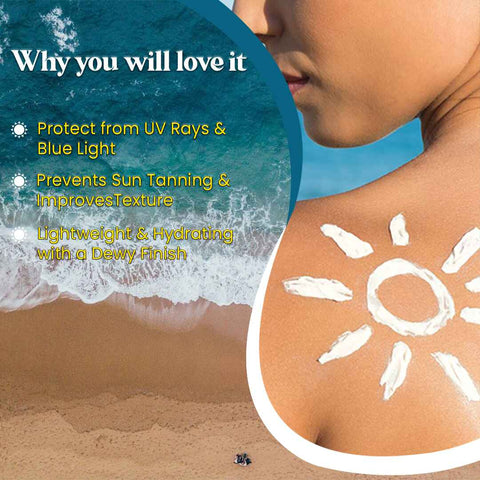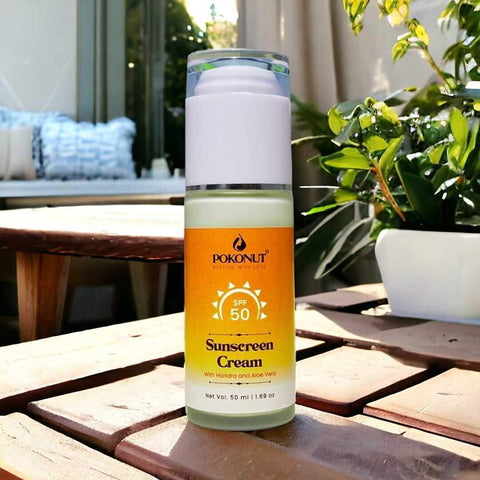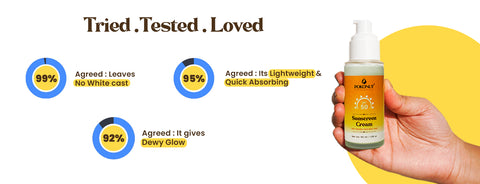The Truth all you need to know about Sunscreens- Bursting myths

Medically Reviewed By:
Dr. Neeraj Bansal, BAMS
Written by Our Editorial Team
Introduction
In today’s world, sunscreen is more than just a beach day accessory; it's a crucial part of our daily skincare regimen, essential for protecting our skin from the harmful effects of UV rays. However, as we slather on these protective layers, many of us are unaware of the chemical cocktail lurking within conventional sunscreens. Here, we introduce POKONUT's Herbal Sunscreen, a beacon of hope for those seeking refuge from these chemical concoctions, and embark on a journey to demystify sunscreen myths, highlighting the unmatched benefits of herbal formulations.
The Hidden Dangers of Chemical Sunscreens
While chemical sunscreens have been the norm for sun protection, growing research points to their darker side. Ingredients like oxybenzone, avobenzone, and octinoxate, common in these formulations, have been linked to hormonal disruptions, skin allergies, and even coral reef degradation. Studies, such as those published in the Journal of Clinical and Aesthetic Dermatology, have raised concerns over these chemicals accumulating in the body and environment, urging a revaluation of what we consider safe sun protection.
Busting Sunscreen Myths
Myth #1: "Higher SPF offers significantly better protection." Reality: SPF values above 50 provide a marginal increase in UV protection and can offer a false sense of security, leading to less frequent application and increased sun damage.
Myth #2: "Chemical sunscreens are safer than physical (mineral) sunscreens." The truth is, physical sunscreens containing zinc oxide or titanium dioxide offer broad-spectrum protection without the risk of skin absorption, making them a safer and more effective choice.
Myth #3: "Sunscreen is only needed on sunny days." Even on cloudy days, up to 80% of UV rays can penetrate the skin, making daily sunscreen application essential, regardless of the weather.
The Rise of Herbal Sunscreens
Herbal sunscreens leverage the natural protective properties of plants to shield the skin from the sun. POKONUT's Herbal Sunscreen combines Aloe Vera, known for its soothing and hydrating properties; Haridra (Turmeric), with its anti-inflammatory and antioxidant benefits; Carrot Seed Oil, rich in Vitamin A and beta-carotene; Tomato Extract, packed with lycopene, a natural sun protectant; and Zinc Oxide, a mineral shield against UVA and UVB rays. This unique blend not only protects the skin but also nourishes and repairs it.
Why Herbal Sunscreen is the Solution of the Hour?
The shift towards herbal sunscreens isn’t just a trend; it’s a movement towards sustainability and health. The environmental toll of chemical sunscreens, particularly their role in coral reef bleaching, has been well-documented, with regions like Hawaii banning certain chemicals. Moreover, the health benefits of herbal alternatives, which offer protection without the adverse side effects of chemical absorption, make them an indispensable solution for conscious consumers.
How to Make the Switch to Herbal Sunscreen?
Transitioning to herbal sunscreen involves reading labels and choosing products with natural protectants. Look for sunscreens that are free from harmful chemicals and rich in plant-based ingredients. POKONUT's Herbal Sunscreen not only meets these criteria but also provides a guilt-free way to enjoy the sun, knowing you’re protecting your skin and the planet.
Conclusion
As we peel back the layers of misinformation surrounding sun care, the benefits of herbal sunscreens come into sharp focus. By choosing POKONUT's Herbal Sunscreen, you’re not just making a choice for superior skin protection; you’re part of a larger wave of change towards health, safety, and environmental sustainability. Let’s embrace the power of nature together and turn the tide on sun protection.
Frequently Asked Questions (FAQs)
Q1: Can herbal sunscreens provide enough protection against the sun?
A1: Yes, herbal sunscreens like POKONUT's Herbal Sunscreen are formulated with natural ingredients such as Zinc Oxide that offer broad-spectrum protection against UVA and UVB rays. When combined with plant-based antioxidants and protectants, they effectively shield the skin from sun damage.
Q2: Are there any side effects of using herbal sunscreens?
A2: Herbal sunscreens are generally well-tolerated by most skin types because they contain natural ingredients that are less likely to cause irritation or allergic reactions compared to chemical sunscreens. However, it's always recommended to patch test any new product before full application.
Q3: How often should I reapply herbal sunscreen?
A3: Similar to conventional sunscreens, herbal sunscreens should be reapplied every two hours, or more frequently if swimming, sweating, or towel drying. This ensures continuous protection throughout the day.
Q4: Can I use POKONUT's Herbal Sunscreen on sensitive skin?
A4: Absolutely! POKONUT's Herbal Sunscreen is specifically formulated with gentle, natural ingredients like Aloe Vera and Turmeric, making it suitable for sensitive skin. Its non-chemical formulation minimizes the risk of irritation and is safe for daily use.
Q5: How does POKONUT's Herbal Sunscreen impact the environment?
A5: POKONUT's Herbal Sunscreen is environmentally friendly, containing biodegradable ingredients and non-nano Zinc Oxide, which is safer for marine life. By avoiding harmful chemicals, it reduces the risk of coral reef bleaching and water pollution, supporting a healthier planet.
Q6: Is herbal sunscreen waterproof?
A6: While POKONUT's Herbal Sunscreen is water-resistant, no sunscreen is entirely waterproof. It's designed to stay effective for up to 40 minutes in water, after which reapplication is recommended to maintain protection.
Q7: Can herbal sunscreen replace my daily moisturizer?
A7: POKONUT's Herbal Sunscreen not only protects against sun damage but also nourishes the skin with hydrating ingredients like Aloe Vera, making it a great two-in-one option for daily use. However, individuals with very dry skin may still benefit from an additional moisturizer.

About Doctor :















1 comment
https://plastikovyye-okna-nedorogo.ru/
Leave a comment
Please note, comments need to be approved before they are published.